By by Naba’a Muhammad, Tariqah Shakir- Muhammad and Charlene Muhammad The Final Call @TheFinalCall
CHICAGO—The last place 63-year-old Diane Latiker should be is around young people in the midst of the Covid-19 pandemic. She and her husband, who is 67, are among the most vulnerable because of their age. Youngsters are less likely to suffer from the disease—but can still carry it.
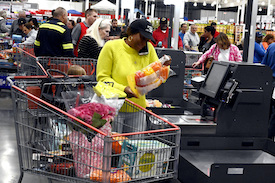
Shoppers stand in line inside a large warehouse retailer, March 12, in Kennesaw, Ga. Amid all the fears, quarantines and stockpiling of food, it has been easy to ignore the fact that more than 60,000 people have recovered from the coronavirus spreading around the globe. Photo: AP Photo/Mike Stewart
But the founder of Kids Off the Block, a program devoted to Black youth and based in the Roseland neighborhood, is feeding young people while public schools are closed. Youngsters may be back to school in April and the governor of Illinois, with Chicago’s mayor by his side, recently announced the city was in shutdown mode. As of March 21, no one except essential personnel is allowed to freely roam the streets.
“We are the most vulnerable, my husband and I are both over 60. Of course, it worries us, and we got the news, and we’re looking at each other and we’re like ‘we gotta go in the house and close the door, curl up and don’t do anything?’ Because we’re vulnerable? And then we looked at each other again and went ‘no, the least we can do is try’ because the young people we had talked to said that they are not going to the school to eat,” she said.
Mrs. Latiker posted plans to feed young people on Facebook and got support. She and her husband were also able to feed the homeless. “They needed help too,” she said. “They be so grateful that somebody in the community that don’t have to care does care.”
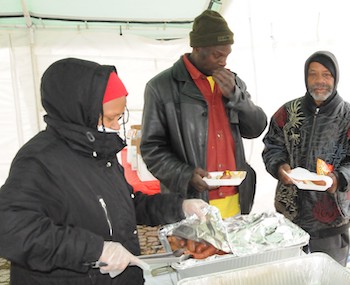
Diane Latiker hands out food wearing mask. Photo: Haroon Rajaee
Malik Thomas, who lives in Roseland, said, “I wasn’t really following the news like that. I feel like there may be a bit of panic and fear going around. I live right here, so seeing this right outside my house is just—I love that, that’s really cool.”
Despite the health risk, Mrs. Latiker plans to keep doing what she is doing. She argues Black children shouldn’t have to go outside of their communities to get help. “When it’s right in their community, that’s special to them. You can feel the love,” she said.
Across the country and from the halls of Congress to the streets of the Windy City, Black activists, political and religious leaders are trying to make sure an already suffering community doesn’t feel extra pain in a time of national crisis.
Many are concerned about how non-profit groups, like Mrs. Latiker’s organization, will fare as the economy grinds to a halt. They also wonder how churches will survive if parishioners can’t come out to worship services and tithe, how the incarcerated, especially aging prisoners, will fare, what the change means for Black America’s way of life, Black workers, Black entrepreneurs and, even, Black voters with some primary elections postponed. At Final Call presstime, 12 states had declared a state of emergency and at least 114,000 public and private schools were closed.
Whether Black adults can do basic things like survive being off work, buy food and whether their children can have internet access to do schoolwork online are real concerns.
The coronavirus, which can strike the respiratory system, has higher than normal death rates, potential to spread, lagging U.S. testing and has impacted or could impact all of these areas.
Despite internet memes and jokes, like Black folks insisting ginger ale can cure the ‘rona, these are serious times.
The coronavirus fundamentally altered the way Americans live. Movement has been curtailed, schools and businesses shuttered, and sports leagues suspended. Public school and colleges closed amid panicked buying and a president who continually lied about the crisis is most concerned with the virus’ economic impact and impact on his reelection.
The Honorable Minister Louis Farrakhan, in a major address in Detroit to close the Nation of Islam’s Saviours’ Day convention, warned America is facing dangerous times under an imperial president and is a nation facing divine judgment.
“As I was watching the impeachment trial of President Trump, I was looking at America, not at her finest hour, but I watched the high level of chicanery; the high level of deceit,” said Min. Farrakhan. Brilliant lawyers on two sides used skillful knowledge of the law to outsmart one another, not to agree on truth, he observed.
“And I watched the Bible being fulfilled: If Satan casts out Satan, how then can his kingdom stand?” said the Minister, who delivered his message before some 15,000 people at the TCF Center in Detroit in February.
“You, my poor, pitiful brothers and sisters, you are opting to be a part of that that is unraveling right in front of your eyes. … The condition of America is puzzling. The world is looking at a country going to hell,” he said.
“So there’s a verse in the Qur’an that I was thinking of. It’s in the 16th Surah, the 92nd verse and it said, ‘Be not like her who unravels her yarn, disintegrating it into pieces, after she has spun it strongly.’ … That’s what’s happening to America as we speak. America was not built on a firm foundation. … How do you build a nation, killing the native people? How do you build a nation, bringing a whole people out of Africa to America to be made slaves? This is your foundation, so for them to lie to you, and make you think that America is a land of promise for you, and you believe it; no wonder Jesus said, ‘You shall know the truth and the truth will set you free,’” he added.
President Trump March 13 declared a national emergency, freeing $50 billion in federal resources to battle COVID-19, amid fears the disease could implode national medical and health care infrastructure.
There were calls for moratoriums on evictions and mortgage foreclosures, fees and fines, cell phone and utility shut-offs, which some companies and localities agreed to.
Anthony Fauci, of the National Institute of Allergy and Infectious Diseases, said Americans “should be prepared that they’re going to have to hunker down significantly more than we as a country are doing.”
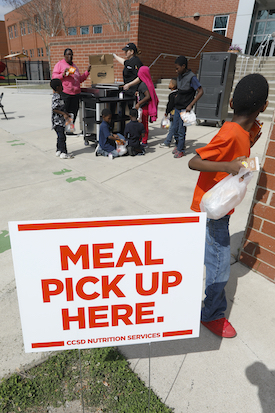
Sarah Richardson, at right, and Cynthia Gourdine, at left, with the nutrition depart- ment for the Charleston County School District, delivers some grab and go bags of food for area school children at Sanders-Clyde Elementary School, March 16, in Charleston, S.C. With all schools closed in South Carolina to at least the end of March because of the Coronavirus area school districts are providing two meals a day to area school children. Photo: AP Photo/Mic Smith
“Everybody has to get involved in distancing themselves socially. If you are in an area where there’s clear community spread, you have to be much, much more intense about how you do that,” he added. The goal is to blunt the curve of confirmed cases and attempt to keep the number of those infected low enough that America’s hospital system isn’t overwhelmed, he stressed.
Rep. Karen Bass (D-Calif.), chair of the Congressional Black Caucus, convened a Tele Town Hall March 20 to discuss how the coronavirus pandemic was impacting Blacks. She and others argued that Blacks need specific measures aimed at getting them through tough times as Covid-19 infections and death rates continued to rise in the United States.
According to the Bureau of Labor Statistics, Black and Hispanic workers are “more than twice as likely to receive poverty-level wages compared to their White counterparts.” About 8 percent of Black and Hispanic workers earn wages below the poverty level compared to 4 percent of their White counterparts and only 29 percent of the workforce was able to work from home.
“We’re talking about families buying goods and stocking up for two to three weeks; well, many of our families are trying to get food for this week,” said Father Michael Pfleger of St. Sabina Church on Chicago’s South Side.
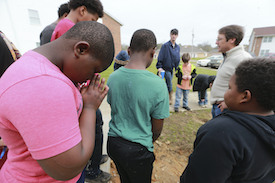
Makennize Young, 8, prays before recieving lunch, March 16, at Hilldale Aparment Complex in Tupelo Mississippi as part of the Tupelo/Lee County Hunger Coalition response to help feed school children who received free or reduced lunches at their schools. Photo: Thomas Wells/The Northeast Mississippi Daily Journal via AP
“They don’t have the luxury of going out and shopping to get stored-up food for their homes. We’re telling people to stay in their houses, but we have thousands of homeless people who have no house to go to.”
“If the state communities do not speak up now and use their voice to speak out and to confront the isolation and abandonment, then we’ve failed, and we don’t have a right to reopen our churches, mosques or synagogues if we’re being silent when the poor most need our voice,” he said. “I think the mindset amongst ourselves should be to connect with each other because we’re already a disconnected society and now this isolation that the government is telling us needs to take place is the danger of people being even more disconnected and leading open the door for depression, for suicide and all the rest that already has high numbers in this country.”
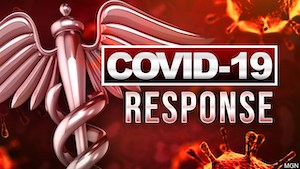
At Final Call press time, the coronavirus had taken over 500 lives in the U.S. and infected thousands of people. Black victims, including actor Idris Elba and NBA star Kevin Durant, dispelled the myth of “melanin immunity” to the virus, which began late last year in Wuhan, China.
Confronting a crisis
“Above and beyond all, we need to protect our health and safety,” commented Marc Morial, president of the National Urban League.
Follow health professional recommendations of social distancing and the elderly, those with respiratory problems like asthma, which are prevalent in Black America, and diseases that compromise the immune system need to protect themselves, he said.
And, Mr. Morial added, “We’ve got to advocate to ensure the federal, state and local governments are going to give considerations to issues of equity as we go forward.”
In California, Governor Gavin Newsom issued a stay at home order, but state agencies will keep providing medical care, food stamps, some employment, cash assistance, and other benefits through May.
Similar to orders in Illinois, New York, New Jersey, Pennsylvania, Connecticut and other places people can go to places like hospitals, doctors, gas stations, pharmacies, grocery stores, famers markets, food banks, convenience stores, take-out and delivery restaurants, banks, laundromats and laundry services—and can even go for walks. Some state and local government offices are open but dine-in restaurants, bars, nightclubs, gyms, public gatherings, and convention centers have been closed.
According to the Pew Research Center, these safety measures will heavily impact Blacks, Hispanics, immigrants, and many under 50, especially those likely to use public transportation.
Among urban residents, 34 percent of Blacks and 27 percent of Hispanics report taking public transit daily or weekly, compared with only 14 percent of Whites, said the Pew Center.
Mr. Morial sees layoffs hitting low-wage, hourly, and younger workers quickly. There was little or no change in Black unemployment rates for workers in February, according to Bureau of Labor Statistics. But unemployment claims have soared.
“These unemployment checks are sometimes 50 percent, 60 percent of one’s paycheck,” said Mr. Morial. “If you’re already a low-income, a low-wage worker, getting an unemployment check certainly is welcome, but it is not sufficient enough for you to pay your rent, to pay for your food, take care of your family, so we have to advocate for a stronger response from an unemployment insurance point of view.”
The federal government is allowing states to change some laws to provide unemployment insurance benefits related to the coronavirus crisis.
Federal law allows states to pay benefits where an employer temporarily ceases operations due to Covid-19, or when someone is quarantined expecting a return to work after quarantine, and if a worker leaves employment due to a risk of exposure or infection or to care for a family member, said the Labor Dept.
The Senate approved March 18 a $100 billion-plus bill to boost testing for the coronavirus and guarantee paid sick leave for millions of workers hit by it. Still, advocates pointed out, there were holes in the bill to ensure the neediest workers are covered.
“The broader recovery plan they are discussing needs to have a focus on people and it needs to be bottoms-up, as opposed to a top down corporate bail-out program,” said Mr. Morial.
He feels President Trump’s initial recommendation of a $1,000 per person relief check is insufficient, though many would welcome it.
“We’ve got to make sure that this plan that they’re discussing has sufficient support for people who are going to lose their jobs, particularly for people who have no cushion, no safety net, no savings,” Mr. Morial continued.
Rep. Bass said more legislation is coming and will need to fill gaps.
“We’ve got to learn from (Hurricane) Katrina. We’ve got to learn from 9/11. We’ve got to learn that if you put resources into an inequitable system, then the benefits are not going to be broadly available, so we’ve got to make sure that they focus on that in how they design this thing,” said Mr. Morial.
As for elections, Black advocates called for expanding vote by mail, same day voter registration and scaling back measures like strict I.D. laws that suppress the Black vote. Advocates called for releasing non-violent offenders, no bail for minor offenses and testing and treatment for inmates. For the Census, they want extra effort made to ensure Blacks are properly counted to qualify for federal funding and political representation.
Turning to one another in tough times
In Los Angeles, activists on Skid Row say they filled the gap when city officials failed the country’s largest homeless population. They launched the Hand Washing Stations for Skid Row campaign, building and placing hand washing stations throughout the 50-block area. Hand washing is considered key to limiting the spread of the virus.
Professional educators and homeschoolers have formed groups online to help children academically and occupy time with arts and crafts.
The Corona Virus Community Support group in Long Beach, Calif., pooled resources to help seniors, single, and pregnant mothers and the disabled.
According to a March 20 post shared by Black Lives Matter activist Dawn Modkins, the group collected canned goods, water, toilet paper, soaps, diapers, baby formula, crackers, bread, personal hygiene and other items to give to neighbors in need.
“It’s amazing that the time we’re in and what we’re facing manifests the truth, the practicality, and the availability of the program of the Honorable Elijah Muhammad, and by that I mean the things that he taught Black people, through such books as How to Eat to Live, apply it now, more than ever,” said Student Minister Ava Muhammad, national spokesperson for Minister Farrakhan.
Among foods some media sources have recommended storing are dried beans, which is what the Honorable Elijah Muhammad taught is good for consumption, namely the small white navy bean, she noted.
Not only have Blacks gotten away from canning to preserve foods, but they have also gotten away from cooking at home, growing food, shopping for fresh vegetables and often eat fast food or pre-packaged food, said Min. Muhammad.
“The upside to this situation is that it is forcing us to pause from the cultural and emotional effect of capitalism. We have been caught up in this whirlwind of material acquisition of commodities where we have a desire, almost like an addiction to designer brand-name closing, going to nail salons, buying make-up and hair, and all of these things that are doing actually nothing to improve our condition,” she said.
“My message to us is from my teacher and that is to go on pause, to calm down, quiet down, and think about being in your place of abode, not only during this crisis, but spending more time there period,” said Min. Ava Muhammad. “I think that we should use this time to do some self-examination and self-analysis about our individual selves and us as a community, and hopefully, that will lead to self-correction.”
Michael Ware, founder of Black Truckers United, told The Final Call Black truckers, and the industry in general, hasn’t been hurt health wise or by a lack of jobs. But, he said, revenue for freight pickup and delivery needs to be higher.
“If that were to come up, it would be a whole lot better for drivers across the board, our people as well as everybody else,” said Mr. Ware, who has been driving for 22 years.
Most drivers aim for freight pay of $2 a mile or higher, so a $3-5 rate is pretty good, but that’s through brokers, not direct shippers, which is a bit more difficult to acquire, he said.
Truckers are at low risk for getting infected because they are usually in their trucks separated from people, said Mr. Ware.
As many brace for more economic shutdowns, Black truckers dealing with major companies, like big, wholesale stores, may stay afloat, and the demand may increase, he said. People and businesses have posted messages of gratitude for truckers on social media, including on his Black Truckers United Facebook page, Mr. Ware added. One person offered not only a trucking parking lot for resting but gave 40 percent off meals for drivers just to say thank you, he said.
(Final Call staff contributed to this report.)